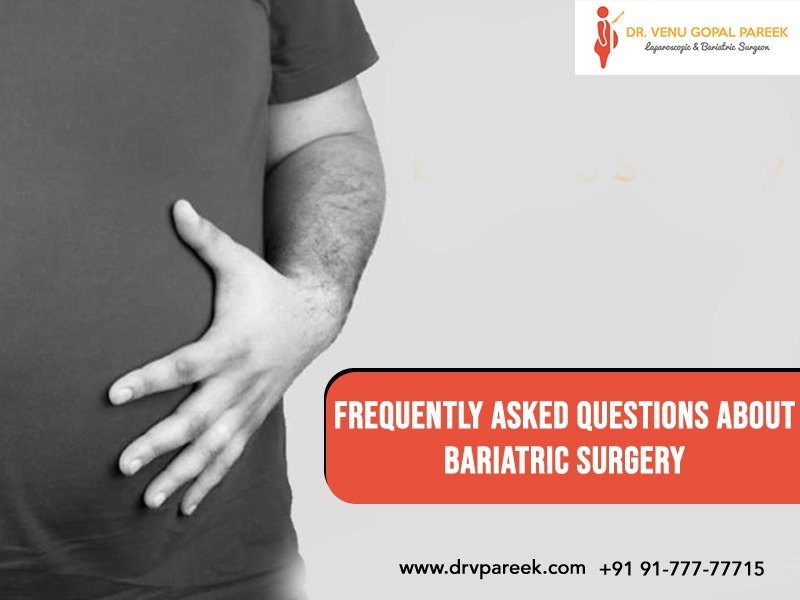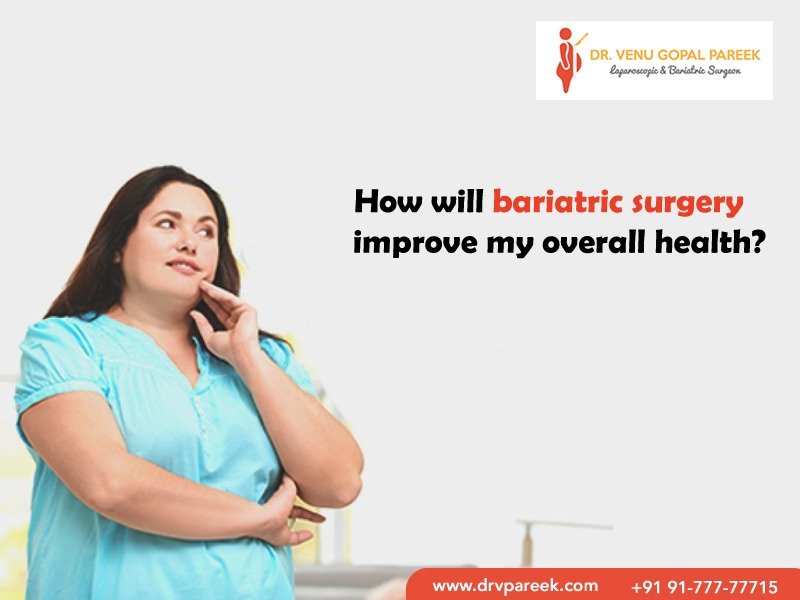
Frequently asked questions about bariatric surgery
Many in the world are tackling the problem of Obesity. The first step is to try out a modified lifestyle. Changing dietary habits and regular exercise should be done irrespective of if you are thinking about weight loss surgery or not. One thing to remember is that surgery is one important milestone in the long journey of weight loss. It is also important to understand Who is eligible for the surgery and what precautions should be taken before and after the surgery. This blog will address commonly asked questions about weight loss surgery.
When should I start thinking about Bariatric surgery?
One should know that Weight loss surgery has a specific criterion, and it is not done for anyone who is overweight. Neither is it done purely for cosmetic purposes. Below are the conditions under which a weight loss surgery is done:-

- If a person’s BMI is 40 or more, i.e., when men are 100 pounds and women are 80 pounds above their normal weight.
- Those with BMI 35 to 40 have heart disease, type 2 diabetes, high cholesterol, or severe sleep apnea.
- Cannot shed those extra pounds by diet and exercise, medication and other non-surgical methods.
How will weight loss surgery help me achieve my weight loss goals?
Though there are various Bariatric procedures, they are all based on 2 principles, as described below:-
Restrictive surgeries: In these types of surgeries, the physical size of the stomach is reduced by various techniques. However, they all reduce the portions of food intake, and the person starts feeling full after eating much lesser than before the surgery. Hence, weight loss is achieved by reducing consumption.
Malabsorptive surgeries: In these types of surgeries, the absorption mechanism of food by the digestive system is changed. A part of the intestine is removed in all of them, creating a shortcut for digestion. These are complicated surgeries, and only fewer calories are absorbed into the body, thereby achieving weight loss.
What are gastric banding and gastric bypass surgery?
Gastric Banding Surgery: Gastric banding is performed with small incisions, using a laparoscope and special instruments. The stomach or intestine is not cut. Hence the patient recovers quickly. The surgery is reversible by removing the band, and there is flexibility to tighten or loosen the band. The patient loses 40% to 50% of the excess weight.
Gastric Bypass Surgery: This surgery has the quickest and dramatic weight loss. There is a chance to lose 60% to 80% of their excess body weight, and hence life-threatening conditions are regulated quickly. However, gastric bypass surgery is riskier and is associated with more complications. Gastric bypass is an irreversible surgery and permanently alters how your body digests food.
How should I prepare for weight loss surgery?
One should understand that much before undergoing surgery itself, and you should start your journey towards a healthy lifestyle. After the surgery, one should be very careful about diet and exercise. Hence, it is good to develop these habits a couple of months before the surgery so that afterwards, it will become easy for you to adapt to the doctor’s recommendations. One month before the surgery should avoid smoking and alcohol. When you go for your first consultation, be completely transparent with your surgeon. Talk to your surgeon about your complete health profile and also your lifestyle. This will help the surgeon decide what kind of surgery you should undergo and when it should be performed.
What are the risks that a weight loss surgery poses?
If the patient does not chew well or eats fast, there is a risk of vomiting. In addition, there are nutritional deficiencies such as anaemia and osteoporosis. Not all patients, but some might develop hernia, ulcers, hair loss and kidney stones.
How Does Weight Loss Surgery Affect Overall Health?
Many medical problems are solved with weight loss surgery, including:-
- Obstructive sleep apnea
- Type 2 diabetes
- Gastroesophageal reflux disease (GERD)
- High cholesterol
- Degenerative joint disease or orthopaedic problems
- High blood pressure
- Asthma
- Urinary incontinence

What are the effects of weight loss surgery on Nutrition?
After weight loss surgery, the body has difficulty absorbing certain important nutrients such as Iron, Vitamin B-12, Folate, Calcium and Vitamin D. Hence the doctors suggest taking multivitamins, and other supplements, to prevent or reduce these deficiencies.
How will my daily life change after weight loss surgery?
One of the main reasons for weight gain after the surgery is that the patient is not following the post-surgical care. The crucial changes are:-
- Dietary changes: The digestive tract changes drastically after the surgery. Hence the patient should eat small portions slowly by chewing very well. Malnutrition is also a common post-surgical effect hence the food intake should consist of a lot of protein. Foods rich in iron, calcium, minerals and vitamins should be consumed regularly.
- Regular exercise: Exercise should now be a part of your life. Exercise keeps the weight in check and enhances metabolism. It is also a great mood elevator.
What are the changes in my physical appearance after weight-loss surgery?
One observes that they have slimmed down, and many are happy to see their new physical appearance. Still, those who had very high levels of Obesity might see sagging skin, which can also be removed via cosmetic procedures.
What kind of support system will I need after the surgery?
After the surgery, it is very important to have a medical team that can guide you from time to time regarding your diet and exercise regime period. It is also good to join a support group of similar individuals so that you can share your experiences freely with them. Your family and friends are a major source of your family, and friends can check on you regularly to follow the post-surgical regime religiously.
How to find the best clinic and the best Bariatric Surgeon?
First and foremost, consider the experience of the surgeon. Dr V.Pareek has 17 years of extensive expertise guiding obese patients towards a healthier and fit life. You can go online and find the clinic and the doctor’s testimonials. The doctor must also be able to guide you about post-surgical care. Dr V.Pareek’s comprehensive end-to-end team consists of nutrition too. They will guide you on how you can slowly get back to eating healthy. Check the doctor’s credentials and do your research before deciding to embark on this journey.
Dr V.Pareek is happy to clarify any queries you might have regarding Bariatric Surgery. So contact us at +91 91-777-77715 and get a clear picture of Bariatric Surgery.







